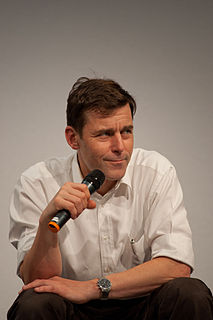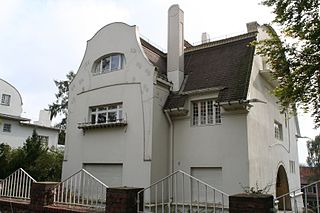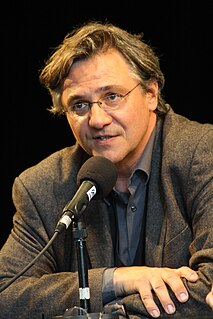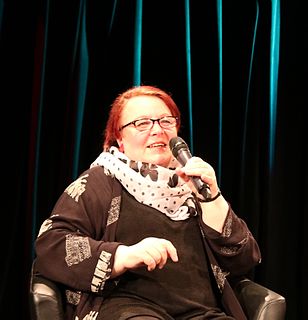A literary award or literary prize is an award presented in recognition of a particularly lauded literary piece or body of work. It is normally presented to an author. This is a list of notable literary awards awarded in Germany.

Johann Peter Hebel was a German short story writer, dialectal poet, Lutheran theologian and pedagogue, most famous for a collection of Alemannic lyric poems and one of German tales.

Paul Nizon is a Swiss art historian and writer.

Ingo Schulze is a German writer born in Dresden in former East Germany. He studied classical philology at the University of Jena for five years, and, until German reunification, was an assistant director at the State Theatre in Altenburg 45 km south of Leipzig for two years. After sleeping through the events of the night of 9 November 1989, Schulze started a newspaper with friends. He was encouraged to write. Schulze spent six months in St Petersburg which became the basis for his debut collection of short stories 33 Moments of Happiness (1995).

Marcel Beyer is a German writer.

Peter Stamm is a Swiss writer. His prize-winning books have been translated into more than thirty languages. For his entire body of work and his accomplishments in fiction, he was short-listed for the Booker Prize in 2013, and in 2014 he won the prestigious Friedrich Hölderlin Prize.

Reiner Kunze is a German writer and GDR dissident. He studied media and journalism at the University of Leipzig. In 1968, he left the GDR state party SED following the communist Warsaw Pact countries invasion of Czechoslovakia in response to the Prague Spring. He had to publish his work under various pseudonyms. In 1976, his most famous book The Lovely Years, which contained critical insights into the life, and the policies behind the Iron Curtain, was published in West Germany to great acclaim. In 1977, the GDR regime expatriated him, and he moved to West Germany (FRG). He now lives near Passau in Bavaria.

The Deutsche Akademie für Sprache und Dichtung was founded on 28 August 1949, on the 200th birthday of Johann Wolfgang von Goethe, in the Paulskirche in Frankfurt. It is seated in Darmstadt, since 1971 in the Glückert House at the Darmstadt Artists' Colony. It is a society of writers and scholars on matters pertaining to German language and literature in the Deutsche sprachraum, or Germanosphere.
Karl Heinz Bohrer was a German literary scholar and essayist. He worked as chief editor for literature of the daily FAZ, and became co-publisher and author of the cultural magazine Merkur. He taught at the Bielefeld University for decades, and also at Stanford University, California. His autobiography appeared in two volumes in 2012 and 2017. Bohrer is regarded as a disputative intellectual thinker and critic, reflecting his time. He received notable awards for criticism, German language and literature, including the Johann Heinrich Merck Prize and the Heinrich Mann Prize.

Peter von Matt is a Swiss philologist and author.

Christoph Hein is a German author and translator. He grew up in the village Bad Düben near Leipzig. Being a clergyman's son and thus not allowed to attend the Erweiterte Oberschule in the GDR, he received secondary education at a gymnasium in the western part of Berlin. After his Abitur he jobbed inter alia as assembler, bookseller and assistant director. From 1967 to 1971 Hein studied philosophy in Leipzig and Berlin. Upon graduation he became dramatic adviser at the Volksbühne in Berlin, where he worked as a resident writer from 1974. Since 1979 Hein has worked as a freelance writer.

Günter de Bruyn was a German author.

Michael Maar is a German literary scholar, germanist and author.

Felicitas Hoppe is a German writer. She received the Georg Büchner Prize in 2012.

Bayerische Akademie der Schönen Künste in München is an association of renowned personalities in Munich, Bavaria. It was founded by the Free State of Bavaria in 1948, continuing a tradition established in 1808 by the Royal Academy of Arts in Munich.
Rheingau Literatur Preis is a literary prize of Hesse. It is awarded annually since 1994 by the Rheingau Literatur Festival which follows the Rheingau Musik Festival. An author is awarded whose prose gained the attention of the literary critics

Reinhard Jirgl is a German writer.

Kathrin Röggla is an Austrian writer, essayist and playwright. She was born in Salzburg, and lives in Berlin since 1992. She has written numerous prose works, including essays, dramas and radio plays. She has won a long range of awards for her literary works.
Maria Beig was a German school teacher and author.

Natascha Wodin is a German writer of Ukrainian origin. She was born in Fürth, Bavaria in 1945 to parents who had been forced labourers under the Nazi regime. She grew up in a camp for displaced persons. Following her mother's suicide, she was raised in a Catholic home for girls. She worked as a telephone operator and stenographer before becoming an interpreter and translator of Russian in the early 1970s.
The Fontane Prize of the City of Neuruppin was donated in 1994 on the occasion of the 175th birthday of Theodor Fontane from his native city of Neuruppin.